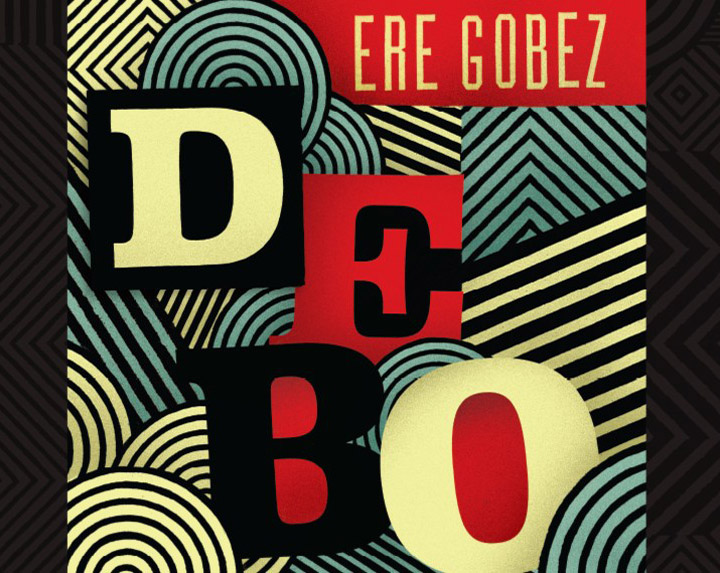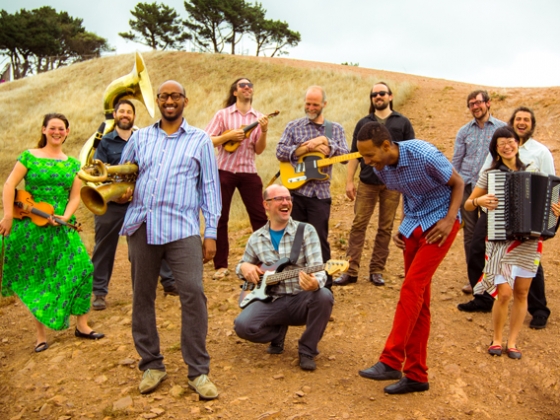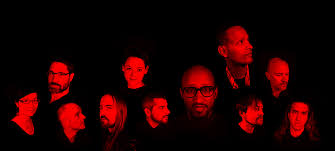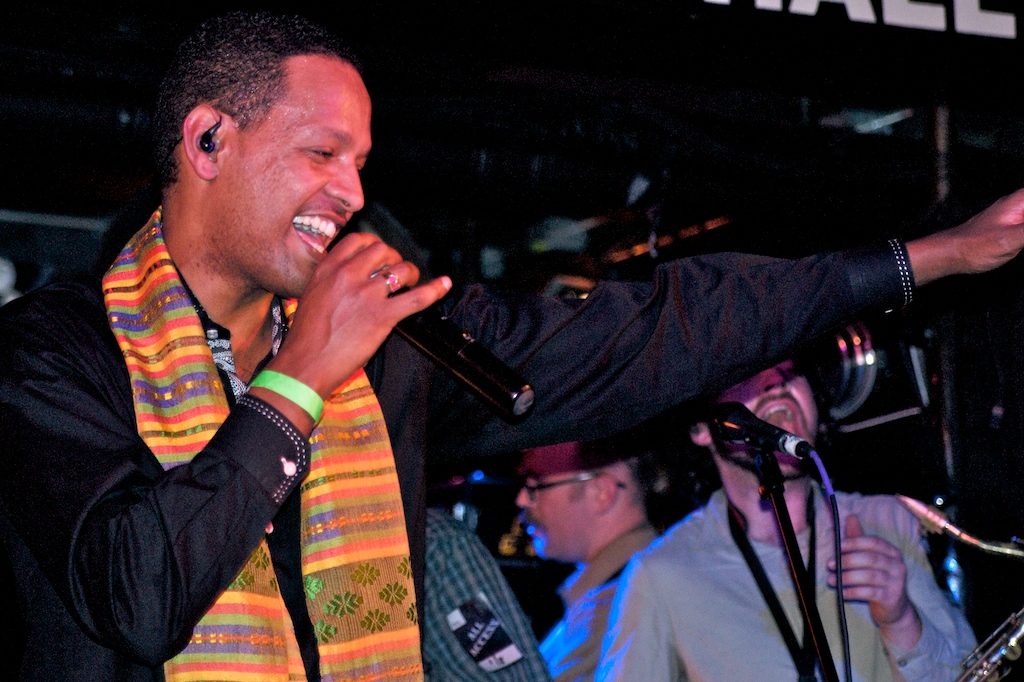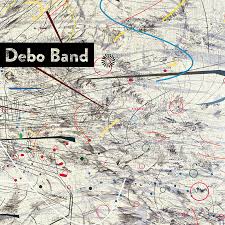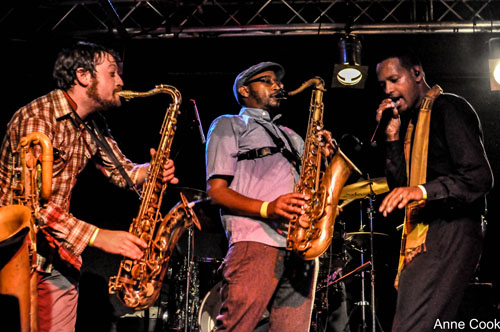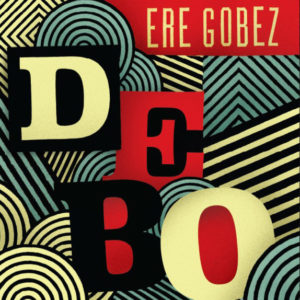The eclectic Boston-based Ethiopian music juggernaut Debo Band releases its second studio album, Ere Gobez, in May, and it is strong medicine. These 11 tracks mix original composition and wildly reworked covers—though nothing you’re likely to recognize—in a bracing milieu of thrashing rock guitar, thick beds of ballsy brass, racing tempos and brooding funkiness. At the center is Bruck Tesfaye’s lithe vocal, by turns sweet and searing, but this is very much a band album with all the intensity of the band’s memorable live shows. Debo Band does far more than reprise the golden era of Ethiopian pop (late ‘60s/early ‘70s). They take that spirit and creativity and catapult it into the present, ably updating and extending one of the most exciting and unique realms of African popular music. Afropop’s Banning Eyre spoke with Debo Band’s founder and leader, Danny Mekonnen. Here’s their conversation.
Banning Eyre: First of all, this is a very strong record you've made.
Danny Mekonnen: Great. I'm glad you like it.
What was the overall concept of this record? What were you trying to accomplish?
The first thing we were looking for is a sound that was more raw, more live, a record that felt less studio produced. It is certainly a studio album, and we took full advantage of what was there for us in terms of gear and everything. It's not like a stripped-down, vintage recording with just a couple of microphones, but we really wanted to capture something live, something raw. We went back and listened to our first record, and it felt expansive, but also a bit stuffy. We wanted to open that up and let the energy of the live band come through. We wanted to feel the raucousness, the driving rock thing that is there in a live show but that wasn't there on the first record so much. That's a big part of it. So we brought the guitar and drums and the rock element up in the mix. But also, it was the way we tracked. There were very few overdubs.
We basically recorded the whole album in two days, with all 11 of us there. Kaetha Hostetter, our fiddle player, who lives in Ethiopia, wasn't in the States at the time, so she recorded her tracks in Ethiopia. She was able to email us these files, and we mixed them in and made something cohesive out of it. And she also was able to produce a couple of sessions with some Ethiopian guest artists, such as a mesenqo player–that's the one-stringed fiddle that we used on one track.
That's the sound we hear on the opening of the song “Sak.”
Yes. And then there's another song called “Oromo,” which features a singer who is part of the band Fendika. The mesenqo player is not from Fendika, but he’s part of the larger group called Ethiocolor that I hope will someday come to the United States.
Right. I know that Debo Band has a history with Fendika. We recorded and interviewed them at globalFEST earlier this year. Really wonderful musicians, and they gave us the Ethiocolor CD, which is also great.
So this new recording is still tied into that world we have occupied in our Ethiopian collaborations with Fendika. But the other thing that served as a focus for the creative direction are these three pieces you could call a suite of remixes, or a suite of reimaginings. So there is the Duke Ellington piece (“Blue Awaze”), and the Japanese Okinawan folk song (“Hiyamikachi Bushi”), and then the Somalian song by Dur Dur Band (“Kehulum Abliche”). Those songs that make up this suite.
We were calling them remixes for awhile, thinking about what DJs do, but doing it with malleable material, in the form of a musical arrangements for a band, as opposed to putting slices of recordings together. The Duke Ellington piece grew out of Ellington's travels in Ethiopia and our fascination with that and wanting to know more. We once shared a bill with Steve Bernstein, the trumpet player, and I met Ellington's former trombone player, Art Baron. Art was on that Ellington tour and I asked him what he remembered of the songs they performed. He couldn't remember a lot of specific repertoire, but I do know that “Safari Suite” could have been something that Duke Ellington performed, because of when it was written. So we just went with that. We imagined that the Duke Ellington Orchestra somehow had this jam session with the Police Orchestra, and that “Blue Awaze” might have been what they would've come up with.
Great concept. What year was that Ellington tour?
1972 or '73.
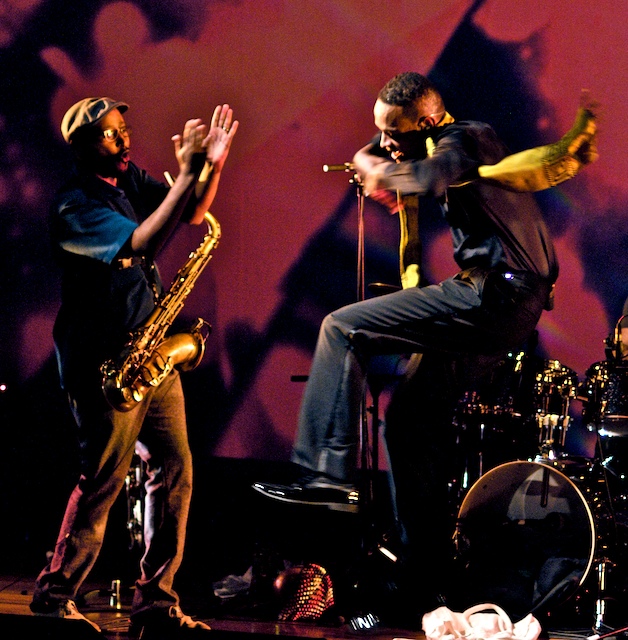 Danny and Bruck Tesfaye (Eyre 2012)
Danny and Bruck Tesfaye (Eyre 2012)
That's optimal timing and terms of catching Ethiopian music at its best.
Yes, it's good timing. Those are some of the most prolific years in Ethiopian popular music. So he was there at the height of it all. I'm sure there were jam sessions. So this is just kind of a way of honoring that and tapping into that creative history, that moment when we all wish we were a fly on the wall or a part of it somehow.
The Okinawan piece is a way to reflect on the Ethiopian soldiers who fought in the Korean War. Haile Selassie was part of that U.N.-Allied contribution, and he sent troops to fight in the Korean War. I think that's an interesting thing because usually Ethiopia comes up in the minds of people in connection with internal struggles, whether that be famine and war or poverty. But in the 1960s, Ethiopia was the site of the African Union. It was involved with international intervention and conflicts, and the Korean War is a big part of that history. Ethiopian soldiers went to the Far East. They went to Korea, and were stationed in Okinawa, and came back with these Ethiopian-Japanese love affairs. So there were a number of songs written by Ethiopians that reflected upon those Far Eastern love interests and affairs. Tilahun Gessesse wrote some of those songs. And then also there's this pentatonic—five-note scale—connection. Those are found in both Ethiopia and Okinawa. So we sort of exploited these similar-sounding scales in this Okinawan folk song. Then our singer Bruck Tesfaye wrote new lyrics for that.
The Somalian song is interesting because we were doing a lot of digging, trying to go deeper into some collections of some friends of ours in Ethiopia who are really into the obscure, choice selections. We got a dump of material and found this song we didn't know anything about. All we knew was that it was this faster kind of oddball 6/8 funk, and we were fascinated by it. We knew it was in a language we did not understand. It was not in Amharic, but we just decided to learn it, and Bruck wrote new lyrics for it. Then later on we found out it was Dur Dur Band, in part through Awesome Tapes from Africa's reissue by that band.
Was this song on that release?
I don't think it's on that album. But if you search around a little bit, the song is there. In our liner notes, you'll see the name of the original. I think it was part of a soundtrack, so I don't know if it was ever released by Dur Dur Band on any of their own albums. In any case, “Kehulum Abliche” is kind of a faster, a little bit more punk rock version of this Somalian song, now with Amharic lyrics.
Beyond these, there were a couple of other songs we discovered. “Sak” is an interesting one, a very rare, unknown composition by an important composer named Tesfaye Lemma, who was the last leader of the Orchestra Ethiopia. The original recording was released after that orchestra was disbanded. It featured a number of prominent members of that orchestra, but Tilahoun Gessesse was the singer.
So all of this is a way of finding these tracks that for whatever reason have not been noticed. Even back in the '70s, these songs were pretty obscure. We wanted to find forgotten songs and hopefully give them a new life. On the first record, it wasn't so much about that. There were a couple of songs that fit that category, but this time, if we did a cover, we did for pretty specific reasons, and it was usually because it was very old and obscure. Hopefully, by putting the material out there, and giving the composer some attention, and hopefully being able to track down the families and give them some royalties, that will be a kind of reciprocity for us. And you never know who will be inspired to take their own research paths. So in a way, a little bit more archival research went into this album.
How do you find these songs? Crate-digging in Addis? The Internet?
We have a friend who is a DJ, crate digger, record collector in Addis. He was our main source for a number of these songs, but not just the songs themselves; he was able to tell us the history. “The song comes from this person.” This kind of information can be very hard to come by. Once you find the track, it's hard to know anything about it. So this comes from a Norwegian expatriate who's been living in Ethiopia for many years. He has actually been involved in some reissues that have come out through Mississippi Records, and also through a record label in New Orleans. So he's got his hands in some of the smaller vinyl imprint reissues of Ethiopian music.
Fascinating. What is his name?
He goes by Kidus, but his real name is Vemund Brune Hareide. His DJ name is DJ Mitmitta. I think you can find him by either that or Kidus.
Now when you recorded it with the 11 musicians, where was that?
We did it in Pawtucket, Rhode Island, about an hour from Boston.
I certainly think you succeeded in your goal to get a raw, raucous vibe. I am looking through my notes, and I see the words "raw" and "raucous" recurring a few times. The energy on these tracks is striking. You feel the band.
I mentioned it in contrast to our previous record, but I also feel that with a lot of large ensemble world music records, the production is great, there's really great songwriting and arranging, but I kind of miss the band. I miss the energy of that thing that you have with a rocking live band—something you can actually feel.
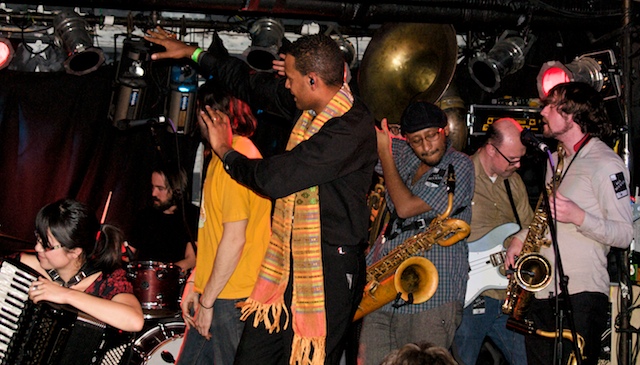 Debo Band at globalFEST (Eyre 2012)
Debo Band at globalFEST (Eyre 2012)
It is a hard thing to achieve. And somehow all the technology and options you have in a modern studio make it even harder sometimes. There's so much attention to each individual sound.
Yes. And the other thing that happens is if you have a project where you have a lot of people who are ringers or session players, that changes things. The personnel on this album has been together for five years. I think we are able to dig in and translate the music in a way that has a lot of energy because of the live aspect of the band. But it was a driving principle for many years leading up to this project: How do we get that sound? And part of it is the material too. The songs are a little bit faster.
Yes. There are some ripping tempos here.
And I think the originals reflect that energy that we were going for. We also wanted to get into some of these darker spaces, faster spaces, noisier spaces. We started to hint at that in the first record.
And it's evident in your live performances.
Yeah. In the studio for the first album, there was this feeling of, “Let's get it right, and let's get all the elements in there.” I think it takes maybe a little bit more maturity and self-confidence that we didn't have the first time around. This time, we had an album under our belts, and we could let 'er rip.
Let's talk a little bit about those originals. What is your composing process? Or maybe there are multiple processes.
Well, some songs come to the band more or less fully realized by the composers. On this album, the originals come from Danilo Henriquez, our trumpet player, and Jonah Rapino, our fiddle player. And then the lyrics are by our vocalist. But those two composers have very different styles. Jonah’s pieces are written down, and we have lead sheets. They change over time. It's not so strict that we have to follow every note on the page as a roadmap. Not by any means. But Danilo’s process is much more like, "Hey, here's how the first section goes." And he will sing the parts to everybody. But I think both of those musicians come in with the song more or less crystallized in their minds, whether it is taught to us orally or on paper.
But then with others, like the guitar player, it might be, "Do whatever you want here. Do your thing here. I left this spot open for you." And then for the vocals, that tends to be more strictly confined within verse and chorus sections. We've had conversations with our vocalist about different ideas for lyrical content. But Bruck kind of goes on his own and writes lyrics in Amharic.
I am curious about his part. When he is writing lyrics, is that something he does with the composer off-line before you present the song to the band? Or is that something that happens with the band?
Well, for example on “Goraw,” I know that Bruck and Danilo kind of went through some ideas. At first it was a love song, and then it became a more patriotic song about Ethiopian exceptionalism and history. And this connects to the last part of the song. It's similar to the kind of music the saxophonist Getatchèw Mèkurya was famous for, that shellèla style, that kind of war chant. There is that thing going on at the end of “Goraw.”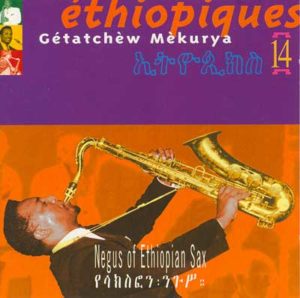
I hear that.
As we write, there is some communication beforehand, off-line. But a lot of it just changes based on the needs of the music. Bruck will kind of take the lead in coming up with those lyrics, but then sometimes they will change over the course of a couple of concerts. We will notice that he's changing things as we go along. So some of that work happens before the band will hear a song, but the rehearsals and the stage are the real laboratory. All of the music on this album was played live for at least two years before we recorded.
That's crucial.
A couple of those songs we recorded at KEXP in Seattle two years ago. And then when we listened to them side by side, I felt us being much more reserved in the radio studio, even though it is a live performance, than the way those songs ended up on the album. I think it is just because that was our first run of shows and live performances. I'm glad we have it on tape and video from out in Seattle, but I think it shows the band developing that material. It's a nice snapshot of the process.
Debo Band's first studio CD
And you can really gauge the effect of two years playing the songs on stage. I think that's part of what I'm hearing in the energy of these new recordings. It's that thing you can't get any other way but through playing the songs live in getting the crowds going night after night. What about the title of the album? What does that mean?
Ere Gobez is something you would hear at the beginning of one of those shellèla war cries, those calls. It translates loosely as something like "call of the lion-hearted." For us, it could be just a call to the dance floor. In the last couple of weeks, as we have been coming to terms with the loss of Prince, you feel that this music has a way of calling you to action, a call of the prophetic. This music is really calling people to become better people. There's something spiritual about that, even in the party jams. Even in songs like "Let's Go Crazy," there is so much energy there.
“Ele,” the opening track on our CD, has a section that is part this garagé style that you find in a lot of these songs. You hear, “Adé, adé, adé.” That's like, "Yes, yes". It's a very simple hyping call, but for us, those calls are more than just, "Are you present? Do you hear us?" It's a way of connecting on a deeper level with our fans, but more than our fans, with humanity, and more than that, with what calls us to be musicians and artists.
There are so many bands out there that are very political, and that's what they are about. We were in the studio recording this album shortly after Michael Brown was killed, around the time that the Eric Garner video surfaced. These are things we really felt. So that call of the lionhearted could also just be a call to bear witness against these sorts of oppressions. Again, it is a bit poetic. It doesn't have a direct translation. But for us, that's what it means, a call to live your life in the most spirited manner in the face of what this life is.
There is that Leonard Bernstein quote about the artist's response to violence: It is to make music more passionately, more fervently. I think that's what we were feeling.
Debo Brass
That's great. Are there any other messages in the lyrics of the songs that you might want to bring out? I see that there are no translations of the lyrics.
It's funny. I know that some people really want translations. But translations are so difficult. Sometimes you will translate something and realize, "Wow, this sounds really corny." It's hard to get the message across. But I think what we really want is somehow that listening to the lyrics will actually get to you. And I am not advocating this kind of "music is universal thing." But just the directness of the voice, and the passion of the voice, that energy is there as well. We have gone back and forth in terms of how much of these lyrics do we want to translate and get into. But there's nothing I want to particularly draw attention to.
I admire that. It's something we've dealt with a lot in terms of African music. Sometimes translating from another sensibility is almost impossible. Either you come up with something that boils it down to such simplicity that the magic is lost, or you end up with something that's so mysterious and obscure that no one knows what to make of it. Either of those can be interesting; I don't think there are any hard and fast rules. But I can relate to the idea that you would just not do that. Just let the sound of the character of the language in the singing communicate and convey the message. Because you really do get a lot from that. The music speaks on different levels.
It is a tricky one. I think about so many artists that we listen to, and I'm thinking particularly about artists who sing in English, and their lyrics are available. You can kind of read along and discover the message. But many times, until you find those lyrics and start to read along, so much of it is not about conveying a message that is automatically understood. It's more about the energy of the voice, the voice as an instrument. It's the singer's intensity or passion coming through. I remember the first time I was listening to "Black Messiah," and thinking, “Wow, D’Angelo sounds great. I have no idea what he's saying, but the song sounds great." Then I got around to the lyrics, and saw that that was another level. That was certainly something I enjoyed, but there are number of singers that of enjoyed listening to and it maybe takes me weeks to even think about what the song might be about.
Certainly in this time of listening to a lot of Prince, I am just kind of enraptured by all of it. And sometimes, what he is actually saying is almost secondary to the whole experience. I know that this is a very different kind of example, especially when we're talking about songs in English, and words that are there to be understood. But I just think that sometimes the meaning of the lyrics is secondary. Oftentimes, they feel secondary to me as a listener.
It can go either way. I have had the experience of reading the lyrics and being amazed at the new interpretations they opened up. I've also had the experience of reading the lyrics and being disappointed, feeling that they don't live up to the emotional impact of the performance. Thanks so much, Danny. It's great to hear about this record. I can't wait to catch you guys live again.
We’re opening up for Antibalas at the Brooklyn Bowl on May 18. It’s Antibalas with Marie Daulne of Zap Mama, and us. Then we will be back around in September.
Well, good luck with the rollout. I think you're going to get a great reaction. This is a very strong recording.
O.K. Thank you very much.







